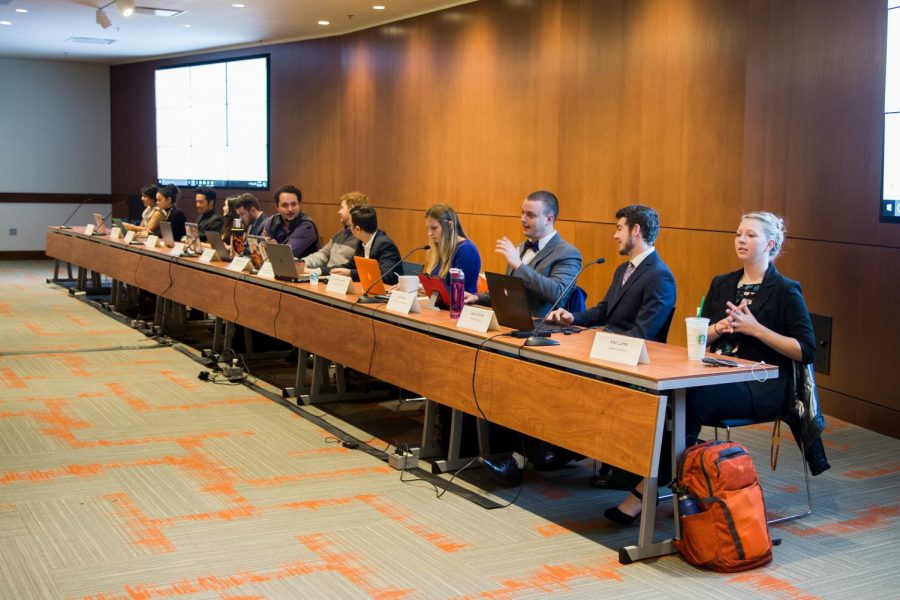ASOSU Congress will vote on student fee levels in joint session
January 22, 2018
Approved budgets to be sent to ASOSU president, Ed Ray, Board of Trustees.
The legislative branch of the Associated Students of Oregon State University will hold a joint session to vote on next year’s student fee levels.
According to Peter Schwartz, the chair of the Student Fee Committee, last term the SFC met to discuss budget proposals from the 10 student fee-funded units they finance. These deliberations culminated in an open hearing, where members of the public had the opportunity to comment and the SFC voted on its proposed budgets.
At the joint session, the fee level recommendations will be put before the ASOSU House of Representatives and Senate, according to Schwartz. Budgets must be approved by simple majority in each chamber to go to ASOSU President Simon Brundage. With Brundage’s signature, the budgets will go to university President Ed Ray and the Board of Trustees for final approval. The joint session meeting will take place at 6 p.m. on Wednesday, Jan. 24 in the Memorial Union Ballroom.
“Our purpose that we have so far accomplished was to listen to budgetary needs from the units, decide on a reasonable, or what we thought was a fair and prudent fee level, and then recommend that to Congress,” Schwartz said.
At the meeting, the SFC will present its recommendations unit by unit, with each presentation followed by open questions from Congress, open questions or statements from the public and finally, a vote.
Different from the U.S. Congress, these bills are not amendable and if they do not pass they will be sent to mediation, according to Schwartz.
According to ASOSU’s Faculty Adviser Drew Desilet, the mediation committee would be made up of a chair and ASOSU Vice President Radhika Shah, as well as three representatives, three senators, the Speaker of the House Peter Halajian and seven SFC members. This group of ASOSU members can amend the bills for each budget which they will send back to Congress for another simple majority vote. A mediation committee can meet as many times as is needed to in order to come to a consensus, but Congress can amend what the mediation committee returns to them, Desilet added.
“The greatest requirement on us as a student government is that President Ed Ray has to have a budget from us by the end of February,” Desilet said. “If he does not, he can make one up.”
As the SFC process has been adjusted over the past year, the organization has tried to ensure that each step is distinct and builds on previous knowledge, according to Desilet.
“We could spend hours next Wednesday night talking about people’s opinions on whether we should fund childcare or travel for ASOSU members,” Desilet said. “As the statutes point out, the time to discuss line items has passed. The time to discuss process is joint session.”
The SFC is made up of 15 members, 10 chosen by the individual units as liaisons and five elected at large by the student body. According to Schwartz, the at-large members ensure that students who are not really involved with anything regarding the budget still are a part of the process that goes into budgeting.
“In each unit there’s an advisory board made up of students, and they’re the ones who are getting a lot of hands-on work actually crafting the budget, as opposed to us who are more reviewing all of the budgets,” Schwartz said.
According to Schwartz, his unit liaisons have been exceptionally responsible and careful about putting together prudent budgets. Presentations have been put together by SFC that are viewer-friendly for students who attend and are not certain of what is happening at the session.
“Both bodies in general have been fantastic in terms of staying involved in the process and being inquisitive and thinking analytically about all this,” Schwartz said. “And it makes my job easier that they’re able to be really involved in the process and makes it easier for any student to get the information they need about these budgets.”
According to Schwartz, a public comment section is a part of each bill being presented, where students who attend sessions can voice their opinion and address both sides of Congress.
“I’ve been encouraging any and all students to show up to this because it is a great opportunity to get your voice heard by Congress and our body and higher up congressional leadership, and that’s what drives change as far as our body’s concerned,” Schwartz said.
The SFC’s Faculty Adviser Leslie Schacht Drey echoed Schwartz on the importance of students providing insight on the fees they will be paying.
“I am continuously impressed by how thoughtfully ASOSU and the SFC seeks the input and feedback from students throughout the SFC process,” Schacht Drey said in an email. “These opportunities to hear feedback from OSU students at large is not only valuable to the students who are voting on the final recommendations, but also to the units receiving the student fees.”











































































































